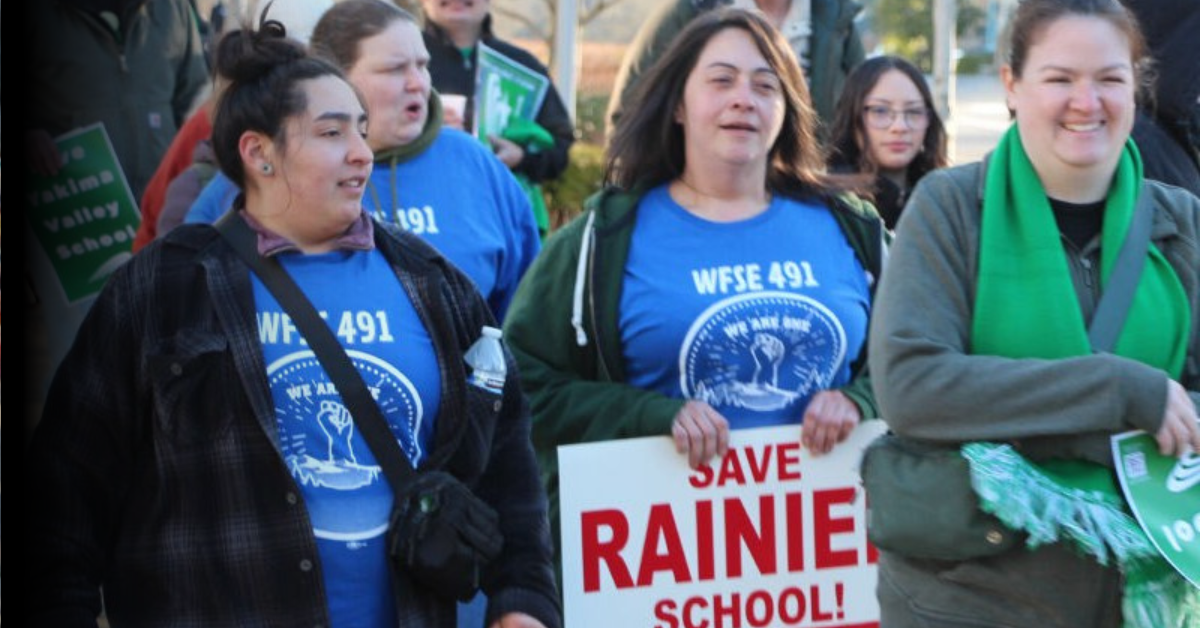STATE GOVERNMENT
WFSE fighting to save services for disabled Washingtonians
The following is from WFSE/AFSCME Council 28:
Town hall and rallies planned as families and advocates fight to save Rainier School and Yakima Valley School
OLYMPIA, WA (March 24, 2025) – AFSCME Council 28, the Washington Federation of State Employees (WFSE) is urgently calling on state leaders to reject plans to close Yakima Valley School and Rainier School, two of the four remaining residential habilitation centers for adults with developmental disabilities.
Governor Ferguson proposed closing both facilities in his outgoing budget proposal. Goveror Ferguson adopted those closures in his budget principles. Senate legislation calls for closing Rainier School but not Yakima Valley School.
A town hall is scheduled for 6pm at the Buckley Fire Station on March 25. Rallies are planned for April 10 in Buckley and Selah.
RHCs serve adults with the most severe intellectual and developmental disabilities, providing round-the-clock care, access to skilled medical professionals, and behavioral support that community-based systems are ill-equipped to deliver. Closing Rainier and Yakima Valley School would eliminate 645 jobs and uproot 119 disabled individuals who rely deeply on routine.

Moving residents into community care settings would put them at risk of neglect, inadequate treatment, or worse.
“Unfortunately, my biggest fear is that they will end up homeless,” says Brittany Barber, a member of WFSE Local 491 and an investigator at Rainier School. “They don’t belong just sitting in a hospital. They don’t belong sitting in jails.”
Community-based providers are already stretched thin. For residents with such complex needs, these closures could mean losing access to skilled caregivers and being forced into unsafe, unstable, or unsuitable living environments. For many, these facilities are their only option.
Families rely on the stability and expertise of Yakima Valley and Rainier Schools to care for their loved ones and are devastated by the possibility of closures.
“There’s people in the community waiting for placements, people stuck in hospitals. That’s inhumane,” said Mary Ann and Lloyd Baker, whose daughter is cared for at Fircrest, one of the four remaining residential habilitation centers.
“There’s no other facility in the community to support them,” they said. “Our daughter lived in a community placement and she self-abused herself so badly she had to be hospitalized. And at the time Fircrest provided infirmary with respite. You would not ever find that in the community. If it weren’t for RHCs, our daughter would probably have been in a hospital emergency room for years. There’s nothing out there.”


Our elected officials have studied the need for RHCs and found the need for them is only increasing.
In 2018, the legislature requested (ESSB 6032, pp. 118-122) that DSHS/DDA engage the William D. Ruckelshaus Center to create a workgroup to study RHC and intellectual/development disability (I/DD) issues. They found that while many DDA individuals live with family, an increasing number will require publicly financed care as their caregivers age.
The consequences of closing RHCS has also become clear. After the Frances Haddon Morgan Center was closed in 2011 in favor of a shift toward community-based care, a former resident died after ingesting liquid laundry detergent.
WFSE is calling on legislators to reject the proposed closures and instead focus on maintaining and modernizing these vital facilities. Yakima Valley School and Rainier School represent a commitment to Washington’s most vulnerable citizens—a promise that must not be broken.
“We can’t cut our way out of this mess,” said WFSE President Mike Yestramski, a psychiatric social worker at Western State Hospital. “But we can begin addressing the structural budget deficit that got us here by demanding that the rich start paying as much as a WSDOT worker, a teacher, or a social worker.”
Learn more at wfse.org.





